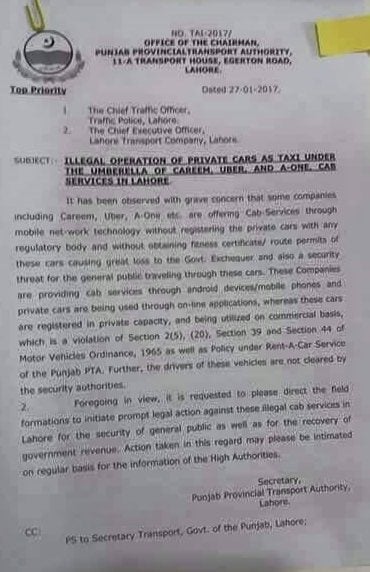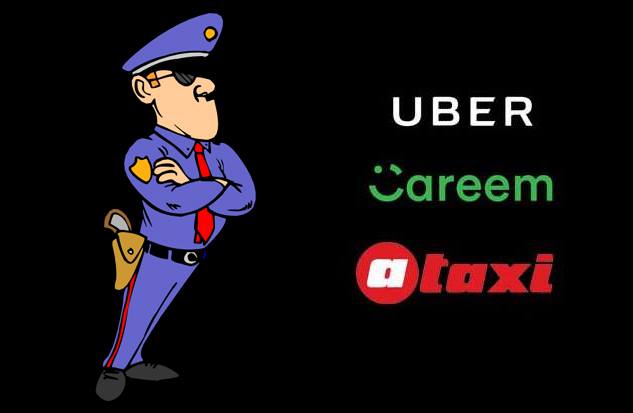The most convenient transport and cab services Careem and Uber suffered a ban from Punjab Government’s Provincial Transport Authority on Monday due to its “illegality”, facing a great criticism from the general masses. The government has issued legal notifications in this regard.

Brief Introduction:
The USA and Dubai-based cab services Uber and Careem, the online cab services with an advantage of “service at home” gained huge fame during the recent times. Reasons being the convenience it offers to the ones looking up for a ride to their required places at an affordable price. The users were charged the fixed rate of kilometers and the time consumed per minute. Plus the tracking system added to its prominence as more women preferred these cab services while traveling alone due to the security it features by providing complete information about driver and car. All that you had to do is to book a ride via an app installed on your smartphone and you can get the cab in minutes. But it was until Monday morning when a status popped up on the City Traffic Police Lahore’s Facebook page.
The official documents:


The agenda:
This leaves us in a state of confusion and we must’ve thought about the hidden agenda behind this decision of the government. What one can assume, is it has been done to promote Turkish Albayrak taxi service who is befitting the government as well by giving proper taxes, while the other services weren’t. Albayrak, on the other hand, was facing a tough competition by uber and Careem due to their low charges/km i.e Rs. 13.7 and Rs. 18 as compared to Albayrak which has a fare rate of Rs. 35 per kilometer. So this seems the best legal strategy by the government if the agenda behind it is to take Albayrak on top. Albayrak Taxi is one of the largest transportation companies in Pakistan providing public transport services with more than 100 Taxi cabs all over Lahore.
The aftermath:
But who is affected the most? Of course the common people and the highly populated mediocre class who were having a quality service on their doors at an affordable price. Plus those who were working as vendors and captains(drivers) in these companies, they will be left jobless after this quick decision of imposing the ban.
Decision reviewed:
The chairman of PITB Umar Saif said after the announcement declaring Uber and Careem “illegal” was made, that the approach is being reviewed.
A tweet of Umar Saif stated:

He told in an interview that the legal decision is being reviewed in collaboration with the government and that the letter was an internal memorandum being disclosed ahead of time. “we will soon be disclosing a formal policy. He also attributed the cab services by using the word of an innovative business model and said that government is handling the issue. He also proposed two approaches to tackle this issue from the time of their launch. The government should either treat them as a properly taxed taxi system or it should be somewhat legal under the control of the government for its regulation scenario.
“We don’t want to treat them as a taxi service,” Saif added. “But they need to be regulated and taxed. They must register as a formal business under a new taxation regime.”
What’s Next?
So what’s next? When asked by Umar saif, he said that they are going to put these can service in the same system prevailing in Malaysia, Egypt, and Indonesia to ensure the proper taxation under which these cab services are treated as “network service providers”.
According to some speculations, this step might have been taken to boost Albayrak Taxi Service or a taxi as it is more commonly known, which was facing tough competition from Uber and Careem.
The generated revenue:
The two of them were becoming the known mode of transport for the public hence generating good revenue. In a case of Uber, the company keeps 25% of the total revenue generated while it distributes 75% with vendors and drivers. The average income that comes in drivers’ share is not so high but reports say that some drivers have succeeded in generating Rs. 100000 per month which is a handsome amount.
In the Middle East, Careem, founded in 2012, is beating it, for now. Careem, which announced a $60 million funding round led by Dubai-based Abraaj Group last November, is in 27 cities. Uber is in 10 – but it announced late last year that it was investing $250 million in the region and that Egypt had become its fastest growing market.




